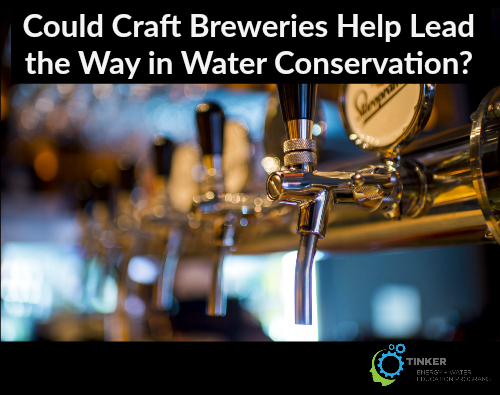Could having a glass of your favorite local brew actually have a positive impact on the environment? Before you head off to happy hour, let’s dive a little deeper into this new revelation.
It seems like craft breweries are popping up in droves all over the country. In fact, there are over 5,000 independently-run breweries in the U.S. today.
They’re great for small town business, they’re fun places to meet and spend time with friends and family, and most of them offer exceptionally-unique drinks and food. So, what does all that have to do with water conservation?
The Water Burden of Beer
 It takes a lot of water to brew beer. That’s obvious. With water becoming more of a scarce resource, it isn’t surprising that many craft breweries have tried to think of ways to reduce their water footprint. By using less water in some areas, they can continue to have enough water to brew their beer. It’s an interesting way of recycling that brings water conservation to an entirely new level.
It takes a lot of water to brew beer. That’s obvious. With water becoming more of a scarce resource, it isn’t surprising that many craft breweries have tried to think of ways to reduce their water footprint. By using less water in some areas, they can continue to have enough water to brew their beer. It’s an interesting way of recycling that brings water conservation to an entirely new level.
For example, the brewing process itself is changing for many craft breweries. The ratio of water-to-beer for brewing used to be 6-1. Many breweries are trying to get that number down as low as possible. Some have even managed to get it down to a 3-1 ratio. This process alone helps to prevent up to 50% of the water that wasn’t needed for brewing!
Recycling water in different ways has also become a popular theme among independent breweries. This is currently being done in many creative ways, from large-scale operations to small brewpubs you may have never heard of.
Some larger breweries are taking the leftover water waste from their brewing process and finding ways to re-use it elsewhere in the brewery. This is where science comes into play. Recycled water from spent grain has been used for certain types of fuel. As you might expect, a brewery uses a lot of energy. Being able to cut down on those costs by using spent grain water as fuel helps the planet in two different ways.
Brewers for Clean Water
 On top of reducing the amount of water they use and finding unique ways to recycle it, brewers are taking an active role in clean water production, too. There is actually an organization called Brewers for Clean Water, designed to help protect the Clean Water Act.
On top of reducing the amount of water they use and finding unique ways to recycle it, brewers are taking an active role in clean water production, too. There is actually an organization called Brewers for Clean Water, designed to help protect the Clean Water Act.
It’s interesting to think that of all the careers and businesses in this country, microbreweries are one of the most influential and opinionated groups when it comes to water conservation. These brewers know that good beer takes good water – and, a lot of it.
By changing their practices and fighting for clean water, breweries are really making a difference in how businesses (especially in the food/drink industry) can make changes to conserve water.
If more businesses followed the trail of the brewing community, we may not have such an intense water crisis in the United States, or all over the world.

